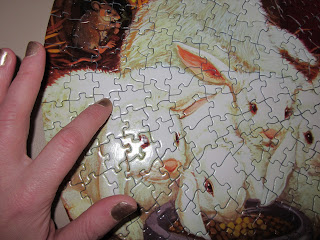Once Colin was identified as being on the autism spectrum, Early Childhood Special Education went to work. He had speech therapy, occupational therapy, play therapy, therapy, therapy, therapy . . . He still does.
We just kept on in the same way we always had. It turns out, we had made a lot of adjustments for him already. We had a marker board so we could draw pictures of what we were going to do that day. We tried to keep as regular a schedule as we could.
I read a lot about autism and got freaked out and stopped reading. I'm just telling you the truth. I didn't want to hear statistics or typical situations. I believe education is very important, but I reached a point where I just couldn't read any more.
You need to understand this -- kids with autism, like snowflakes or marbles or whatever metaphor you like, are all different. They have certain commonalities which identify them, but they react in different ways to different degrees. They call it a spectrum. There are the kids who can't talk or walk or respond on one end and there are the very high functioning "quirky" kids with
Asperger's on the other end. The rest, like Colin, fall in between. Colin does not classify as Asperger's because he does not have the repetitive or obsessive behavior associated with it, but he is very high functioning -- which is just a ridiculous phrase if you ask me. Like every human being going through life, Colin has made amazing progress in some areas and not so much in others.
This is what I want to say to you. This, more than anything, is what I want you to understand.
Don't ever assume that a kid with autism is stupid or incapable or -- dare I say it -- slow.
Colin does grade level work and is an A and B student.
He has to be pulled out of the classroom for half a day to do this because in the classroom he is too distracted by noises, lights, and what other people are doing to pay attention.
Colin will race down the hill on his sled.
He WILL NOT put his face in the water. Neither will my mother.
Colin is very literal. He has to study idioms and memorize what the mean. He has a terrible imagination. He has a difficult time lying (which I find to be sort of helpful).
Social situations are hard for him to understand. Facial clues are hard. Body language is hard. He has to work at it and it is exhausting for him. He hates to talk. He hates to make conversation. He will say as little as possible and bolt to the other side of the room. He will very softly repeat what has just been said. We are told he is listening to it again to hear how it sounded and check his work.
Yet he still wants to be included.
Also his mother may have been overprotective.
Don't assume Colin won't want to do something until you ask him -- as two dear friends did this weekend.
Don't, as one teacher did, tell me Colin will never function as an independent adult.
Because, lady, you don't know jack about what God and Colin are capable of.





